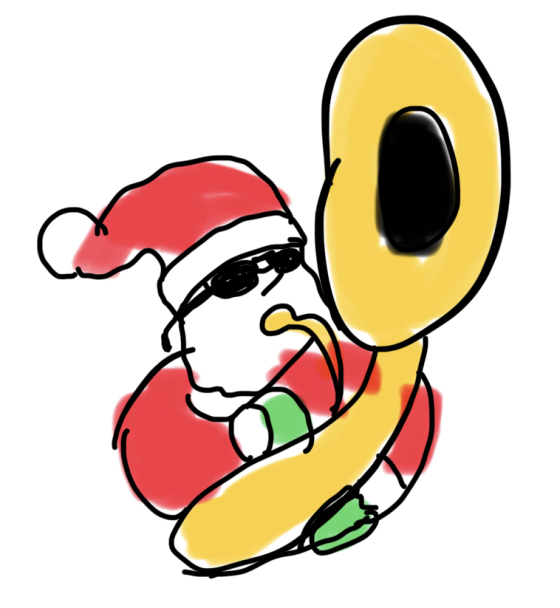2023.12.25
The biggest thread comes from Joseph Campbell's "The Power of Myth" a book we're reading (based on a PBS series back in the day) for my UU Science and Spirituality class.
He's quick to make a distinction between mythology and religion, besides pointing out the archetypes that so many mythologies share. Going to a Sunday/Christmas Eve day service with my Mom and Aunt, I see all the stuff that I know came before or after Christianity in its most ascetic form; the Christmas tree, the poinsettias, even the time of year that has MUCH more to do with old moods of the transition of the seasons than any actual birthdate of Jesus. But in the Campbell context, I guess that makes the Santa-laden tradition I grew up with seem more resonant, not less. (Side note; As I'm writing this, I've been watching "The Chosen" with my folks which seems a pretty sophisticated retelling of Jesus and the Disciple's story. Last night had some "making of" around the Christmas special that was also kind of interesting.)
My superniece Cora is getting into "Therian" stuff - a community of folk who see resonant parallels between various animals (their "theriotype") and themselves. I'm glad she's not woo-woo about it (I think she's been instilled with a more or less humanistic and science-accepting framework) - It would be easy to dismiss it as just a furries-adjacent lark, but right now I can see - it's a pretty resonant mythology for her. Through the history of humanity people have found exactly these kinds of parallels so important to their development, and I think with a little poking I could see long and deep roots in shamanistic traditions that so many cultures have drawn from, though ones that are a little thin on the ground in the Judeo-Christian soil we walk on.
Another thread: The "Making Sense" podcast just had an episode with Brian Muraresku, who wrote a book about about ancient mystery religions and their use of psychedelics that might have had a strong influence in the Hellenistic strain of early Christianity. (Notably, Muraresku is Catholic, and abstains from psychedelics.) Like when you hear about older religions - many older than Greek culture - with aspects about drinking symbolic divine blood-wine, the path to the Christian "this is my body, this is my blood" sacrament of the Eucharist gets more interesting - just like how an appreciation for Mary's role led to a Europe full of cathedrals named Notre Dame.
There is so much that protestant American Folk Christianity leaves behind when it tries to strip away the trappings and get back to basics. (Actually maybe some of the snake handler / speaking in tongues Pentecostals get back to those earlier, more ecstatic forms of religion?) They even gloss over things in their own Bible - who is the rest of "Us" in "And God said, Let us make man in our image, after our likeness"? Is Sophia/Wisdom of the second half of Proverbs 8 just a poetic conceit, or is there something weird and older and more beautiful going on there? Explaining away those bits is kind of weird for a faith that claims to look to only its scriptures as God's protected final word for so much.
Still it feels my own path may always be a bit more humanist, and rationalistic and skeptical. The Protestant God I grew up deserved to control everything in me and my Preacher Parents' life in part because it was a faith that was true (and available) for EVERYONE - but that faith turned out to be brittle when I grew up enough to ponder the justifications for so many other, competing Faiths. So the biggest, most last impact of that fracture is that I tend to reject mythologies - anything that seems to rely on a special, one-time revelation that you have to take on trust. And in this model, humanistic (and non-authoritarian!) rationality is the most empathetic kind of belief, because the important thing is, you don't have to take anyone's word on anything and it's available to everyone. (Of course it gets snarled up in the "Paradox of Tolerance", since it has to accept that most people will always cling to their people's or their own special revelations.)
Which I guess brings me to my folks. For years I was afraid to bring my skepticism up with my mom (though I suspect she'll be reading this or I might even point it out to her.. Hi Mom!) Being a minister as well as being my mom, she represented the voice of God and judgement to me, but I knew she was bummed I didn't find a church when I went off to college, and so I tried to keep that side of me hidden. But many years ago we had a good conversation about it, and I think her view leans more into John 14:2a (In my Father's house are many mansions: if it were not so, I would have told you.) than John 14:6 (Jesus saith unto him, I am the way, the truth, and the life: no man cometh unto the Father, but by me), which I think is compatible with the kind of humanist UU "multiple paths" approach I find most likely. (So technically, I guess I did find a church, but mostly I co-lead a science and spirituality discussion group there, and do most of my nurturing small community-ing with my activist street bands.)
And that leaves me with my dad - or rather his absence, since he died when I was early in my own teenage time of growth and change. There's some dialog there that may never happen in the way I would have liked, maybe even conflicts that will never be quite resolved in the way I wish they could be. But as Joseph Campbell points out "Frequently, in the epics, when the hero is born, his father has died, or his father is in some other place, and then the hero has to go in quest of his father" so maybe there's hope for me yet.
Merry Christmas!
I'll probably be finishing the Campbell book today, and ran into this quote: "Any god who can invent hell is no candidate for the Salvation Army."
That's some stirring synchronicity, given how much a fear of hell and The Salvation Army as an organization were two of the biggest shaping forces of my young life!

via

29 Strange Things People Do With Their Significant Other I find some of these weirdly sexy and romantic.
